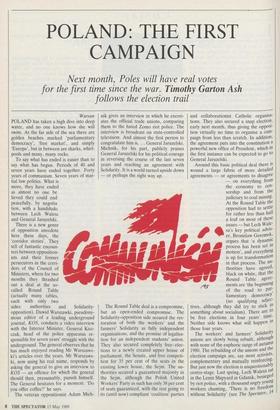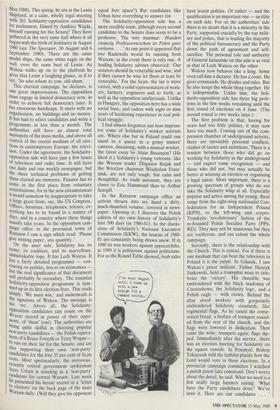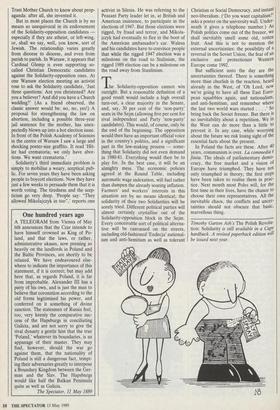POLAND: THE FIRST CAMPAIGN
Next month, Poles will have real votes
for the first time since the war. Timothy Garton Ash
follows the election trail
Warsaw POLAND has taken a high dive into deep water, and no one knows how she will swim. At the far side of the sea there are golden beaches marked 'parliamentary democracy', 'free market', and simply 'Europe', but in between are sharks, whirl- pools and many, many rocks.
There is a new genre of opposition anecdote here these days, the 'corridor stories'. They tell of fantastic encoun- ters between opposition- ists and their former persecutors in the corri- dors of the Council of Ministers, where for two months they thrashed out a deal at the so- called Round Table (actually many tables, each with only two
sides: authorities and Solidarity- opposition). Dawid Warszawki, pseudony- mous editor of a leading underground journal, KOS, conducts a video interview with the Interior Minister, General Kisz- czak, head of the police apparatus re- sponsible for seven years' struggle with the underground. The general observes that he has much enjoyed reading Mr Warszaws- ki's articles over the years. Mr Warszaws- ki, now using his real name, responds by asking the general to give an interview to KOS — an offence for which the general should then, presumably, punish himself. The General hesitates for a moment. 'Do you offer coffee?' he says.
The veteran oppositionist Adam Mich- nik gives an interview in which he excori- ates the official trade unions, comparing them to the hated Zomo riot police. The interview is broadcast on state-controlled television. And almost the first person to congratulate him is. . . General Jaruzelski. Michnik, for his part, publicly praises General Jaruzelski for his political courage in reversing the course of the last seven years and reaching an agreement with Solidarity. It is a world turned upside down — or perhaps the right way up.
The Round Table deal is a compromise, but an open-ended compromise. The Solidarity-opposition side secured the res- toration of both the workers' and the farmers' Solidarity as fully independent organisations, and the promise of legalisa- tion for an independent students' union. They also secured completely free - elec- tions to a newly created upper house of parliament, the Senate, and free competi- tion for 35 per cent of the seats in the existing lower house, the Sejm. The au- thorities secured a guaranteed majority in the Sejm, although the Polish United Workers' Party as such has only 38 per cent of seats guaranteed, with the rest going to its (until now) compliant 'coalition' parties and collaborationist Catholic organisa- tions. They also secured a snap election, early next month, thus giving the opposi- tion virtually no time to organise a cam- paign from less than scratch. In addition, the agreement puts into the constitution a powerful new office of President, which in the first instance can be expected to go to General Jaruzelski.
Around this basic political deal there is wound a large fabric of more detailed agreements — or agreements to disagree
— on everything from the economy to cen- sorship and from the judiciary to coal mining. At the Round Table the opposition had to settle for rather less than half a loaf on most of these issues — but Lech Wale- sa's key political advis- er, Bronislaw Geremek, argues that 'a dynamic At process has been set in motion', and everything is up for transformation in that process. The au- thorities have agreed, black on white, that the Round Table agree- ments are 'the beginning of the road to Par; liamentary democracy (no qualifying adjec- tives, although they did try to stick in something about socialism). There are to be free elections in four years' time• Neither side knows what will happen in those four years. The workers' and farmers' Solidarity unions are slowly being rebuilt, although with none of the euphoric surge of autumn 1980. The rebuilding of the unions and the election campaign are, say most activists, complementary and mutually reinforcing• But just now the election is unquestionably centre-stage. Last spring, Lech Walesa sat in the Lenin Shipyard in Gdansk, besieged by riot police, with a thousand angry young workers chanting, 'There is no freedom without Solidarity' (see The Spectator, 14 May 1988). This spring, he sits in the Lenin Shipyard, at a calm, wholly legal meeting with 261 Solidarity-opposition candidates for parliament, filmed by Andrzej Wajda, himself running for the Senate! They have gathered in the very same hall where it all began with the birth of Solidarity in August 1980 (see The Spectator, 30 August and 6 September 1980). There are the same model ships, the same white eagle on the wall, even the same bust of Lenin. As Walesa walks up on to the platform he gives that Lenin a laughing glance, as if to say, 'So who whom to you, old chum.' This election campaign, he declares, is one great improvisation. The opposition must engage in limited democracy now, in order to achieve full democracy later. It has enormous handicaps. It starts with no organisation, no buildings and no money. It has had to select candidates and write a programme in less than a month. The authorities still have an almost total monopoly of the mass media, and above all control of the crucial medium of all elec- tions in contemporary Europe: the televi- sion. Under the agreement, the Solidarity- Opposition side will have just a few hours of television and radio time. It will have one daily and one weekly newspaper, but the sheer technical problems of getting these started are immense. Finance has to Come in the first place from voluntary contributions, for in the new circumstances It would somehow be inappropriate to take a large grant from, say, the US Congress. Offices, furniture, telephones, telexes, ev- erything has to be found in a matter of days, and in a country where these things usually take years. In the opposition cam- paign office in the provincial town of Rzeszow I saw a sign which read: 'Please give writing paper, any quantity.' On the asset side, Solidarity has its name, its tradition, and its marvellous, unmistakable logo. It has Lech Walesa. It has a fairly detailed programme — con- vincing on politics, less so on economics but the real significance of that document will probably be secondary. The essential Solidarity-opposition programme is sum- med up in its first election flyer. This reads simply P y 'We must win,' and underneath is the signature of Walesa. The message is the ,we,. Above all, the Solidarity- dIVosition candidates can count on the 40-year record in power of their oppo- nents, of 'them' (oni). The authorities are being quite skilful in choosing popular non-party candidates — the Polish equiva- lents of a Bruce Forsyth or Terry Wogan to run on their list for the Senate, and are also supporting their own 'non-party' candidates for the free 35 per cent of Sejm seats. Most spectacularly, the notorious, recently retired government spokesman Jerzy Urban is standing as a 'non-party' candidate for central Warsaw. Last week he presented his heroic record in a 'letter to electors' on the back page of the main Warsaw daily. (Will they give his opponent equal free space?) But candidates like Urban have everything to answer for.
The Solidarity-opposition side has a more credible team, although every second candidate to the Senate does seem to be a professor. The wits murmur: 'Hundert zwanzig Professoren/schon ist Polen ganz verloren. . ..' At one point it appeared that two Radziwills would be running from Warsaw; in the event there is only one. A leading Solidarity adviser observed: 'Our senators should be venerable and wise, and if they cannot be wise let them at least be venerable.' For the Sejm, the list is more varied, with a solid representation of work- ers, farmers, engineers and so forth, as well as the opposition intellectuals. Unlike in Hungary, the opposition here has a wide social base, and cadres with eight or nine years of hardening experience in real poli- tical struggle.
I had almost forgotten just how impress- ive some of Solidarity's worker activists are. Where else but in Poland could one stand in a queue in a grimy miners' canteen, discussing, with a manual worker, the latest essay by Alain Besancon? (He liked it.) Solidarity's young veterans, like the Warsaw leader Zbigniew Bujak and the Wroclaw chairman Wladyslaw Frasy- niuk, are not only tough, but calm and thoughtful. As trade unionists, they are closer to Eric Hammond than to Arthur Scargill.
In the Rzeszow campaign office an activist thrusts into my hand a dirty, much-thumbed volume, covered in news- paper. Opening it, I discover the Polish edition of my own history of Solidarity's first 500 days (in 1980-81). In the discus- sions of Solidarity's National Executive' Commission (KKW), the lessons of 1980- 81 are constantly being drawn anew. If in 1980 its was workers against apparatchiks, in 1989 it is politicians against politicians.
For as the Round Table showed, both sides have learnt politics. Or rather — and the qualification is an important one — an elite on each side. For on the authorities' side there is no doubt that it is a minority in the Party, supported crucially by the top milit- ary and police, that is leading the majority of the political bureaucracy and the Party down the path of agreement and self- sacrifice. The personal role and authority of General Jaruzelski on this side is as vital as that of Lech Walesa on the other.
Walesa now behaves like a king. Some even call him a dictator. He has a court. He gives commands. He divides and rules. But he also keeps the whole thing together. He is indispensable. Under him, the Soli- darity-opposition side has three big prob- lems in the few weeks remaining until the first round of elections on 4 June. (The second round is two weeks later.) The first problem is that, having for years had too little politics, it may now have too much. Coming out of the com- pression chamber of underground activity, there are inevitable personal conflicts, clashes of tactics and ambitions. There is a tension between those who did go on working for Solidarity in the underground — and expect some recognition — and those who did not, but may actually be better at winning an election or organising a legal union. More important, there is a growing spectrum of groups who do not take the Solidarity whip at all. Especially popular and active among the young, these range from the right-wing nationalist Con- federation for an Independent Poland (KPN), to the left-wing and crypto- Trotskyite 'revolutionary' faction of the re-founded Polish Socialist Party (PPS- RD). They may not be numerous but they are vociferous, and can colour the whole campaign. Secondly, there is the relationship with the Church. This is crucial. For if there is one medium that can beat the television in Poland it is the pulpit. In Gdansk, I saw Walesa's priest militant, , Father Henryk Jankowski, hold a triumphal mass to cele- brate the 'victory'. His chasuble was embroidered with the black madonna of Czestochowa, the Solidarity logo, and a Polish eagle — with crown. Behind the altar stood workers with gorgeously embroidered Solidarity standards, like regimental flags. As he raised the conse- crated bread, a fanfare of trumpets sound- ed from the rear of the church, and the flags were lowered in dedication. Then came the wine; trumpets again; flags dip- ped. Immediately after the service, there was an election meeting for Solidarity on the square outside. In Przemysl, Bishop Tokarczuk told the faithful plainly how the Lord would vote in these elections. In a provincial campaign committee I watched a parish priest take command. Don't worry about the detail, he said. What we need is a few really large banners saying: 'What have the Party candidates done? We've seen it. Here are our candidates . . Trust Mother Church to know about prop- aganda: after all, she invented it.
But in most places the Church is by no means so unequivocal in its endorsement of the Solidarity-opposition candidates especially if they are atheist, or left-wing, or, shall we say, well, you know, sort of Jewish. The relationship varies greatly from diocese to diocese, and even from parish to parish. In Warsaw, it appears that Cardinal Glemp is even supporting so- called Christian Democratic candidates against the Solidarity-opposition ones. At one Warsaw election meeting an activist rose to ask the Solidarity candidate, 'Just three questions: Are you christened? Are you a believer? And did you have a Church wedding?' (As a friend observed, the classic answer would be: no, no, yes!) A proposal for strengthening the law on abortion, including a possible three-year jail sentence for the mother, has unex- pectedly blown up into a hot election issue. In front of the Polish Academy of Sciences in the centre of Warsaw I saw a large and shocking poster-size graffito. It read 'Hit- ler had crematoria; we only have abor- tions. We want crematoria.'
Solidarity's third immediate problem is simply to mobilise a weary, sceptical pub- lic. For seven years they have been asking people to boycott elections. Now they have just a few weeks to persuade them that it is worth voting. The tiredness and the scep- ticism go very deep. 'People say: "They allowed Mikolajczyk in too",' reports one activist in Silesia. He was referring to the Peasant Party leader let in, at British and American insistence, to participate in the elections of 1947. But those elections were rigged, by fraud and terror, and Mikola- jczyk had eventually to flee in the boot of the American ambassador's car. Walesa and his candidates have to convince people that while the rigged 1947 election was a milestone on the road to Stalinism, the rigged 1989 election can be a milestone on the road away from Stanlinism.
The Solidarity-opposition cannot win outright. But a reasonable definition of a good result would include a high overall turn-out, a clear majority in the Senate, and, say, 30 per cent of the 'non-party' seats in the Sejm (allowing five per cent for rival independent and Party 'non-party' candidates). This would, of course, only be the end of the beginning. The opposition would then have an important official voice in the country's politics, and a significant part in the law-making process — some- thing that Solidarity did not even demand in 1980-81. Everything would then be to play for. In the best case, it will be an almighty mess. The economic policies agreed at the Round Table, including automatic wage indexation, will fuel rather than dampen the already soaring inflation. Farmers' and workers' interests in this situation are by no means identical; the solidarity of their two Solidarities will be sorely tried. Different political parties will almost certainly crystallise out of the Solidarity-opposition block in the Sejm. Every conceivable sort of political alterna- tive will be canvassed on the streets, including old-fashioned 'Endecj a' national- ism and anti-Semitism as well as tolerant
Christian or Social Democracy, and instant neo-liberalism. (`Do you want capitalism?' asks a poster on the university wall. Under- neath it gives a telephone number.) As Polish politics come out of the freezer, we shall inevitably smell some old, rotten fruit. And this is not to mention the external uncertainties: the possibility of a reversal in the Soviet Union, the fear of an exclusive and protectionist Western Europe come 1992.
But sufficient unto the day are the uncertainties thereof. There is something more than churlish in the reaction, heard already in the West, of 'Oh Lord, now we're going to have all these East Euro- pean squabbles again, and nationalism, and anti-Semitism, and remember where the last two world wars started . . So bring back the Soviet freezer. But there is no inevitability about a repetition. We in the West can do more than a little to prevent it. In any case, while worrying about the future we risk losing sight of the essential facts about the present. In Poland the facts are these. After 40 years, communism is over. La commedia e finita. The ideals of parliamentary demo- cracy, the free market and a vision of Europe have triumphed. They have not only triumphed in theory; the first steps have been taken to realise them in prac- tice. Next month most Poles will, for the first time in their lives, have the chance to choose their own representatives. All the inevitable chaos, the conflicts and uncer- tainties should not obscure that basic, marvellous thing.
Timothy Garton Ash's The Polish Revolu- tion: Solidarity is still available in a Cape hardback. A revised paperback edition will be issued next year.




























































 Previous page
Previous page